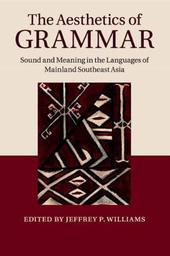
|
The Aesthetics of Grammar: Sound and Meaning in the Languages of Mainland Southeast Asia
Paperback / softback
Main Details
| Title |
The Aesthetics of Grammar: Sound and Meaning in the Languages of Mainland Southeast Asia
|
| Authors and Contributors |
Edited by Jeffrey P. Williams
|
| Physical Properties |
| Format:Paperback / softback | | Pages:306 | | Dimensions(mm): Height 230,Width 150 |
|
| Category/Genre | Grammar and syntax |
|---|
| ISBN/Barcode |
9781108790383
|
| Classifications | Dewey:495 |
|---|
| Audience | | Tertiary Education (US: College) | | Professional & Vocational | |
|---|
| Illustrations |
25 Tables, black and white; 2 Maps; 4 Line drawings, black and white
|
|
Publishing Details |
| Publisher |
Cambridge University Press
|
| Imprint |
Cambridge University Press
|
| Publication Date |
12 December 2019 |
| Publication Country |
United Kingdom
|
Description
The languages of mainland Southeast Asia evidence an impressive array of elaborate grammatical resources, such as echo words, phonaesthetic words, chameleon affixes, chiming derivatives, onomatopoeic forms, ideophones and expressives. Speakers of these languages fashion grammatical works of art in order to express and convey emotions, senses, conditions and perceptions that enrich discourse. This book provides a detailed comparative overview of the mechanisms by which aesthetic qualities of speech operate as part of speakers' grammatical knowledge. Each chapter focuses on a different language and explores the grammatical information of a number of well- and lesser-known languages from mainland Southeast Asia. It will be of great interest to syntacticians, morphologists, linguistic anthropologists, language typologists, cognitive scientists interested in language, and instructors of Southeast Asian languages.
Author Biography
Jeffrey P. Williams is Professor of Anthropology and Interim Dean of the College of Arts and Sciences at Texas Tech University.
Reviews'A groundbreaking introduction to an important, long-neglected phenomenon. The descriptive and theoretical problems posed by expressive systems are a serious challenge for the next generation of linguists, and scholars seeking to engage this challenge will begin with this volume.' Scott DeLancey, University of Oregon
|